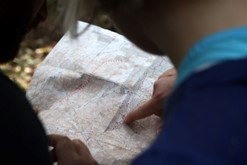Ability to break away from normal life
Outdoor experiences provide participants a chance to get away from their normal routines and remove themselves from external influences such as family, work, social media and school, creating a sense of autonomy. At our 4-H residential camp, there is a natural void of cell phone service which creates an even stronger break away from technology and social media for both campers and our teen counselors. Our teen counselors have stated that they appreciated the time away from worrying about what friends were doing and how they were portraying themselves on social media. They could concentrate on their roles and responsibilities as a caretaker for the younger campers. Furthermore, they indicated that the youth were able to be more of themselves at the outdoor camp setting due to the fact that they were away from the labels and masks they felt they needed to have in their normal life. Belinda Kirk describes this break from routine as "a time away from normal routines that starts with letting go of what you were, followed by a transition period when you find something new in yourself as you explore, and the final stage of bringing the lessons home as you find a meaningful role in the world" (pp 97 - 98). We'll explore more activities that foster this self-awareness next week.
A guided experience in nature
As we facilitate youth in their experiences in outdoor spaces, we don’t have to be content experts, we can invite others that can teach specific skills and knowledge. In some of our programs, I bring in colleagues and volunteers that can teach wilderness first aid, plant identification, and wildlife habitat management. This not only gives youth some of the basic safety and conservation knowledge for being more comfortable in the outdoors, but it also gives the youth a chance to meet experts with a passion for the outdoors. I always have the instructors tell their career story so youth can hear about a variety of outdoor careers. Reflection activities throughout the outdoor learning experience are provided for youth to deepen their learning and apply it to other parts of their lives.
Invitation to explore
As program designers, it’s important that we develop the session flow with both guided lessons and space for play and free exploration. The outdoor learning environment is rich in opportunities for young people to have new learning, discover new skills, play, and connect with nature. In her book, Adventure Revolution, Belinda Kirk writes about adventure experiences: "[People] learn to rely on themselves and their own skills, efforts, and problem-solving abilities. This boosts their confidence levels but also makes them more willing to take responsibility for their own lives, decisions and outcomes, and more motivated to make good choices in the future" (p. 72). Ensure that your program session plan provides open times that youth can explore outdoor spaces on their own. In our winter program, youth have several hours where they can choose between several activities, such as broomball, snowshoeing, tubing, or simply hanging out outside. While lightly supervised to make sure youth are safe, youth have an opportunity to explore, play, and individualize their connection to the outdoors.
In your outdoor program design, where do you intentionally plan for free exploration or reflection? Where can you invite others in to teach?
Next week, in the last series of this blog, we'll explore challenge, intensity, and developing activities that foster self-awareness.
You are welcome to comment on this blog post. We encourage civil discourse, including spirited disagreement. We will delete comments that contain profanity, pornography or hate speech--any remarks that attack or demean people because of their sex, race, ethnic group, etc.--as well as spam.

Comments
Post a Comment